Key takeaways:
- The anti-death penalty movement emphasizes the need to address systemic injustices and the stories of wrongfully condemned individuals.
- Activism is vital for raising awareness and pushing for reforms, prompting discussions about the failures of the justice system.
- Personal connections and narratives within community engagement can profoundly impact awareness and inspire collective action against capital punishment.
- Sharing one’s story and fostering platforms for collective storytelling can empower others to take action and advocate for justice.

Understanding the anti-death penalty movement
Understanding the anti-death penalty movement requires delving into its moral and legal implications. For me, engaging with this movement opened my eyes to the stories of individuals wrongfully condemned. I often find myself reflecting on the question: how many innocent lives could we have saved if we had only chosen mercy over punishment?
At its core, the movement challenges us to rethink justice. I remember attending a rally where a former death row inmate spoke about his harrowing experience of near execution. Listening to him made me realize how the fear of the death penalty can often overshadow true justice, leaving a trail of pain and unresolved trauma for families involved.
Many advocates highlight the systemic inequalities within the death penalty framework. Often, it is the marginalized who face its harshest realities. Each case tells a story of societal failure, prompting me to wonder: if we can be so wrong about justice in these instances, can we really consider such a system to be fair or just? These questions keep the conversation alive and inspire me to continue sharing my journey in this crucial fight against capital punishment.
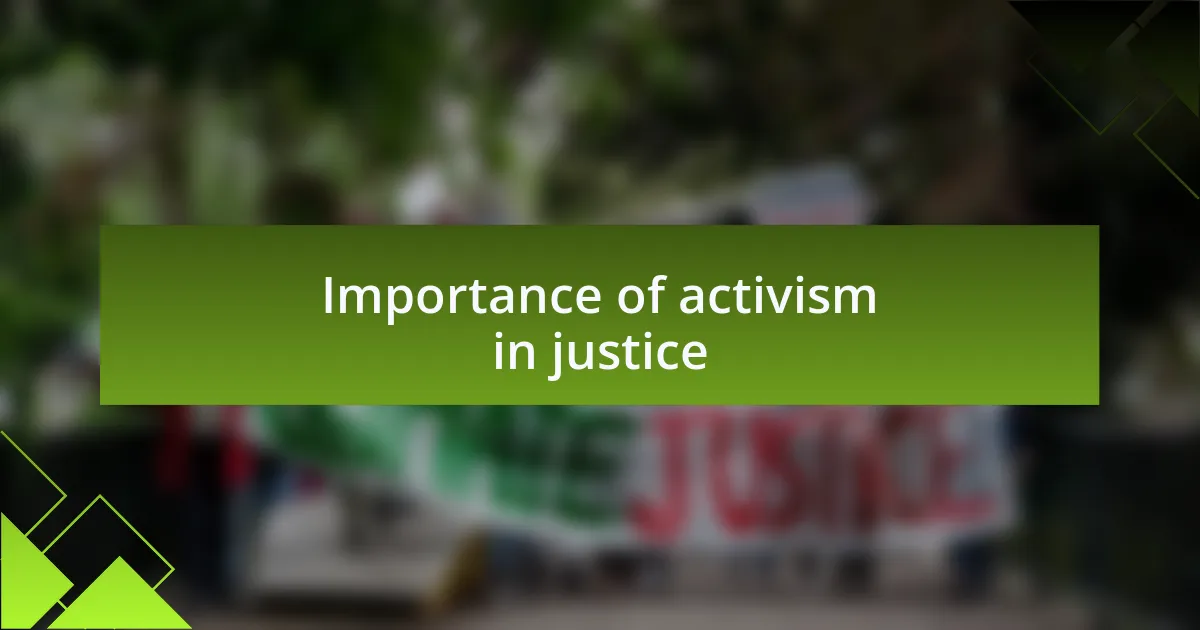
Importance of activism in justice
Activism plays a pivotal role in shaping the landscape of justice. I recall a moment during a community event when a family member of a wrongful conviction victim spoke about their unwavering grief. It struck me that activism not only brings awareness but also gives a voice to those silenced by a flawed system. Have you ever experienced the heartfelt impact of a personal story? I know I have, and it’s these narratives that fuel our commitment to justice.
Moreover, activism serves as a beacon for reform. When I joined a local advocacy group, we worked tirelessly to push for legislative changes. The energy in the room was palpable; everyone was united by a common goal. It made me reflect on the power of collective action. If we can advocate together, couldn’t we really shift the prevailing attitudes toward justice?
Finally, sustaining activism can foster a deeper understanding of the complexities within the justice system. I often find myself engaged in discussions where uncomfortable truths emerge—like the fact that wrongful convictions disproportionately affect people of color. How can we turn a blind eye to these disparities? Activism compels us to confront these uncomfortable realities, encouraging an ongoing dialogue that is essential for meaningful progress.
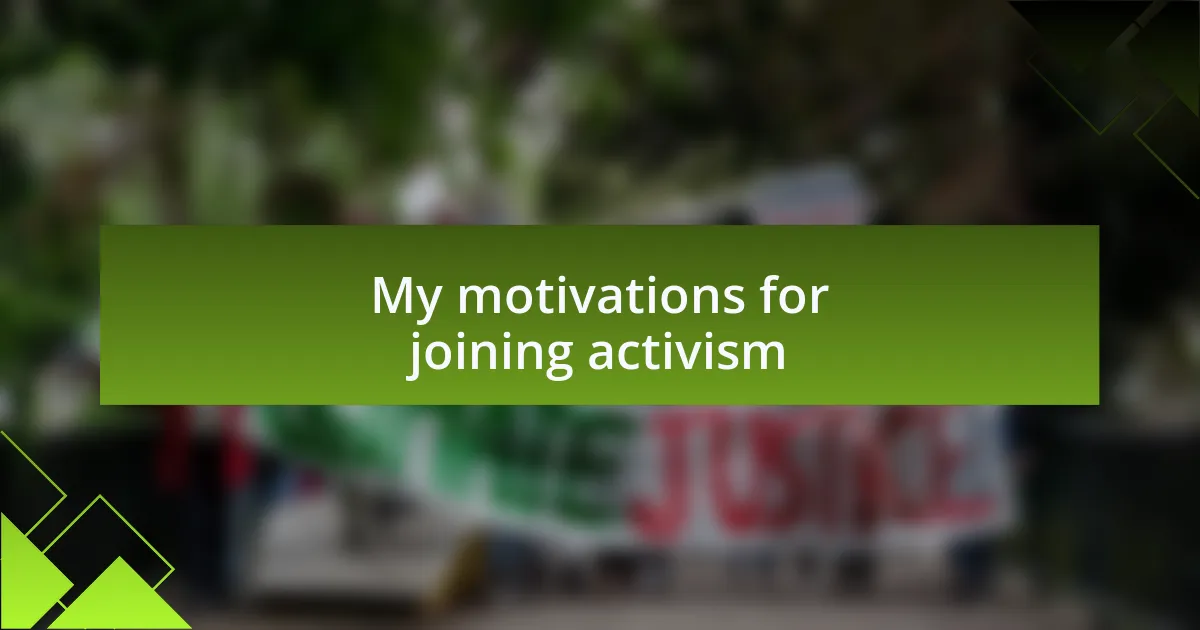
My motivations for joining activism
When I think about my motivations for joining activism, the story of a close friend who was wrongfully imprisoned continually resonates with me. Their ordeal opened my eyes to the stark realities of a justice system that can fail so dramatically. Have you ever felt a sense of urgency ignited by someone else’s pain? That moment drove me to seek change, to ensure that no one else would suffer in silence due to a flawed system.
I also remember attending a vigil for a death row inmate, unjustly convicted, whose life was hanging in the balance. Standing among others who shared my outrage, I felt a deep, palpable connection—a shared commitment to fight against this inhumane practice. I realized then that my motivations stem not only from empathy but also from a desire to foster solidarity among those who believe in justice. Isn’t it empowering to know we can unite our voices for a cause greater than ourselves?
Every time I reflect on my activism journey, I return to the core belief that every life matters. The visceral emotion I felt while hearing the stories of victims—and their families—has fueled my pursuit of justice. How can we allow our legal system to perpetuate such harmful decisions? The desire to challenge this injustice is at the heart of my activism, pushing me to advocate more passionately and tirelessly than ever before.
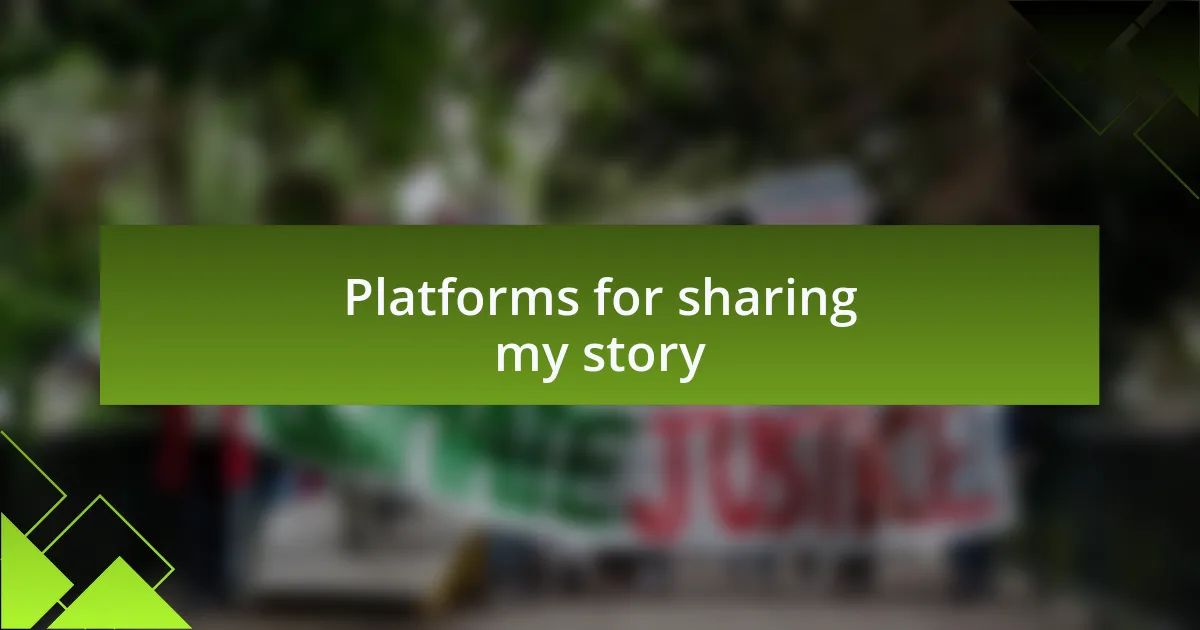
Platforms for sharing my story
In sharing my activism journey, social media platforms like Twitter and Instagram have become essential tools for amplifying my voice. I vividly recall a post I made highlighting an online petition for a wrongfully convicted individual. It felt incredible to see how quickly my followers engaged, signing and sharing the petition—proof that a single shared story can spark broader awareness and action. How powerful is it to connect with others so swiftly across the globe?
But it’s not just about rallying support online; I’ve found immense value in participating in community forums and local events. I remember attending a town hall meeting where I shared my insights and personal connection to anti-death penalty activism. Engaging directly with others face-to-face fosters a deeper understanding of the issue, allows for meaningful discussions, and builds lasting relationships within the activist community. Don’t we all thrive when we feel part of something larger?
Additionally, writing articles or blogs has been a profound outlet for me. I once penned a piece reflecting on the emotional toll of losing someone to state-sanctioned violence. Publishing that story on a platform dedicated to social justice opened the door for dialogues I never anticipated. It demonstrated that sharing one’s narrative can inspire others to contribute their own experiences, fostering empathy and sparking change. Isn’t that what we hope for—a ripple effect of stories transforming lives?
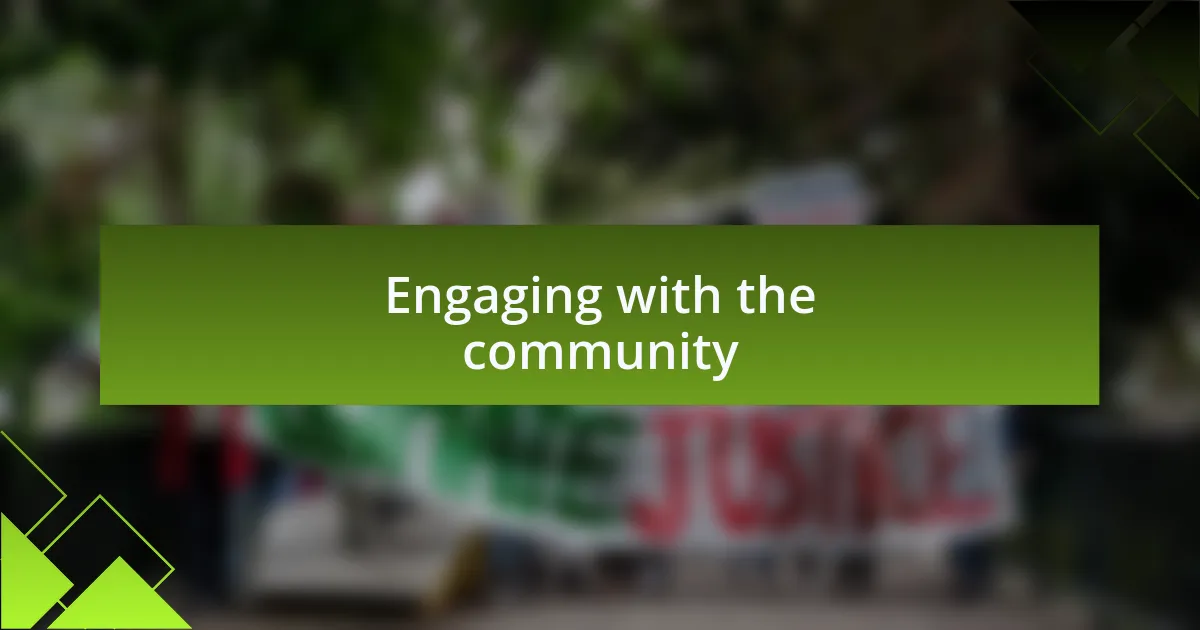
Engaging with the community
Engaging with the community requires active participation beyond online platforms. I remember volunteering at a local anti-death penalty rally, feeling the palpable energy of that gathering. It was uplifting to share stories with others, each one echoing a commitment to justice. Isn’t it invigorating to be part of a group united by a shared purpose?
I also found great success in organizing workshops focused on educating community members about the impact of the death penalty. During one such session, a woman shared how her brother’s wrongful conviction affected her family. Hearing her story not only moved me deeply but also sparked a vibrant discussion about systemic flaws. These interactions reveal the power of empathy—connecting heart-to-heart can drive change in ways mere statistics cannot.
Furthermore, I’ve seen that engaging with local schools has been particularly rewarding. I often speak to students about the realities of capital punishment, using engaging activities to make the topic relatable. It’s heartening to watch their eyes light up with understanding and even indignation at the injustices. Don’t you think that sparking awareness in future generations is one of the most vital aspects of activism?
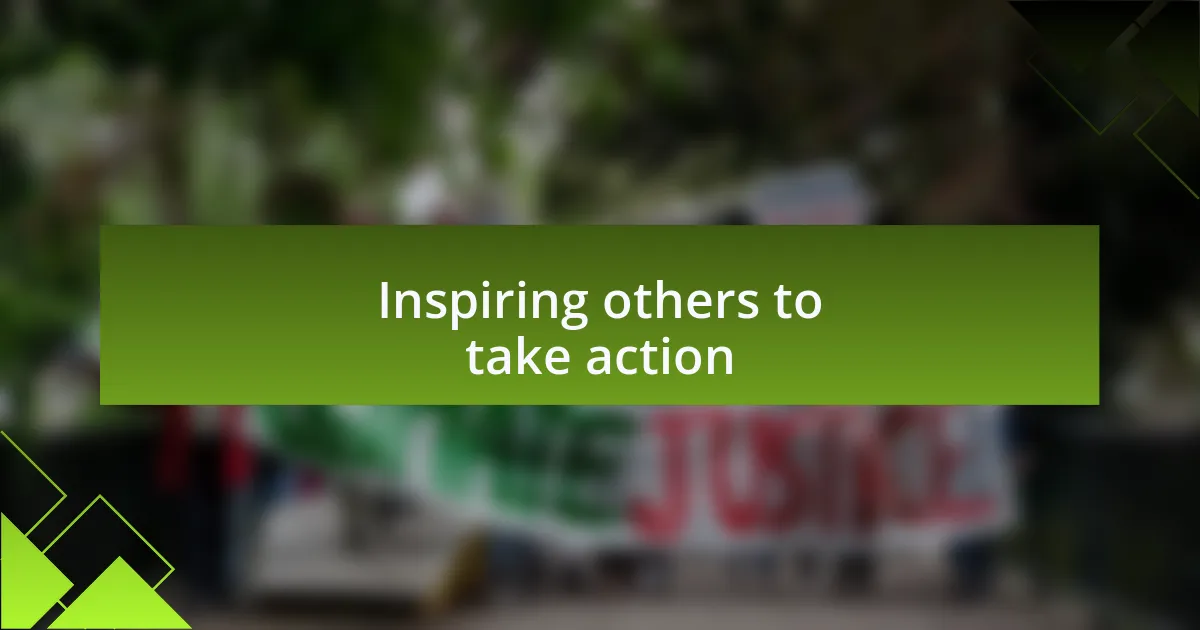
Inspiring others to take action
Inspiring others to take action often starts with sharing my own story. I recall the moment I attended my first anti-death penalty meeting; I felt overwhelmed yet empowered as we shared strategies and personal motivations. It was in that space that I decided to use my voice, and I wanted others to realize the impact their voices could have too. Have you ever felt that spark of connection when hearing someone’s passion?
In addition, I’ve discovered that creating platforms for collective storytelling can be incredibly impactful. One memorable evening, I hosted an open mic event where individuals shared their experiences related to the death penalty. The stories ranged from personal tragedies to tales of activism, and seeing participants tear up or cheer brought home the importance of our shared struggle. How might our world change if everyone took a turn to speak their truth?
I often encourage my friends to take small, meaningful steps toward activism. Just last month, one friend attended a city council meeting after I shared how accessible these platforms are. Seeing her inspired action reminded me that change starts with a single decision to engage. Isn’t it remarkable how the courage of one person can ignite the drive in another?